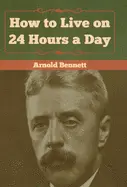
How to Live on 24 Hours a Day - by Arnold Bennett
ISBN: 935417924XDate read: 2022-01-25
How strongly I recommend it: 8/10
(See my list of 430+ books, for more.)
Go to the Amazon page for details and reviews.
Delightful quick droll funny old book from 1908 about how to make the best use of your time. I like his written voice. I like his points on poetry, novels, curiosity, empathy, martyrs, reading the news, and of course making the most of every minute you have.
my notes
You cannot waste time in advance. The next year, the next day, the next hour are lying ready for you, as perfect, as unspoilt, as if you had never wasted or misapplied a single moment in all your career. You can turn over a new leaf every hour if you choose.
The idea of devoting thirty or forty consecutive minutes of wonderful solitude reading of newspapers is repugnant.
People say: “One can't help one's thoughts.”
But one can.
The control of the thinking machine is perfectly possible.
And since nothing whatever happens to us outside our own brain; since nothing hurts us or gives us pleasure except within the brain, it is supremely important to be able to control what goes on in that mysterious brain.
Without the power to ensure obedience from the brain, true life is impossible.
Mind control is the first element of a full existence.
The first business of the day should be to put the mind through its paces.
Devote part of your day to the deliberate consideration of your reason, principles, and conduct.
Burglars in jail are miserable because their principles are contrary to burglary. If they genuinely believed in the moral excellence of burglary, penal servitude would simply mean so many happy years for them.
Martyrs are happy, because their conduct and their principles agree.
When one believes that nothing happens without a cause, one grows not only large-minded, but large-hearted.
It is hard to have one's watch stolen, but one reflects that the thief of the watch became a thief from causes of heredity and environment which are as interesting as they are scientifically comprehensible; and one buys another watch, if not with joy, at any rate with a philosophy that makes bitterness impossible.
One loses, in the study of cause and effect, that absurd air which so many people have of being always shocked and pained by the curiousness of life. Such people live amid human nature as if human nature were a foreign country full of awful foreign customs.
Nothing is humdrum.
Tell us why, as the natural result of cause and effect, the longest straight street in London is about a yard and a half in length, while the longest absolutely straight street in Paris extends for miles.
It is only the bad parts of novels that are difficult.
A good novel rushes you forward like a skiff down a stream, and you arrive at the end, perhaps breathless, but unexhausted.
The best novels involve the least strain.
Read poetry before anything.
Imaginative poetry produces a far greater mental strain than novels.
It produces probably the severest strain of any form of literature.
It is the highest form of literature.
It yields the highest form of pleasure, and teaches the highest form of wisdom.
Begin by reading Hazlitt's famous essay on the nature of poetry in general.
It is difficult to imagine the mental state of the man who, after reading Hazlitt's essay, is not urgently desirous of reading some poetry before his next meal.
I know people who read and read, and for all the good it does them they might just as well cut bread-and-butter.
Unless you give at least forty-five minutes to careful, fatiguing reflection upon what you are reading, your reading time is chiefly wasted.
Having once decided to achieve a certain task, achieve it at all costs of tedium and distaste.
The gain in self-confidence of having accomplished a tiresome labour is immense.